CHINA IN CANADA WARNS SPY CHIEF
The head of CSIS -- Canadian Security Intelligence Service,
revealed details about foreign government espionage
on Canadian soil involving Canadian politicians.
Richard Fadden said that Cabinet Ministers in two provinces
are under control of foreign governments --
which in espionage circles are called
"agents of influence" or "secret supporters".
So are several members of British Columbia municipal governments.
At least 5 foreign countries are surrepticioulsy recruiting future political prospects --
China the most aggressively.
CHINA IN CANADA WARNS SPY CHIEF
"I'm making this comment because
I think it's a real danger that people be totally oblivious to this kind of issue....
I think there are a number of countries around the world that have
...quite aggressive intelligence relationships against us.
A goodly number of countries use every tool at their disposal
from diplomacy to spying.
My message would be that we need to be aware of this possibility."
~ Richard Fadden, Director of CSIS
revealed details about foreign government espionage
on Canadian soil involving Canadian politicians.
Richard Fadden said that Cabinet Ministers in two provinces
are under control of foreign governments --
which in espionage circles are called
"agents of influence" or "secret supporters".
So are several members of British Columbia municipal governments.
At least 5 foreign countries are surrepticioulsy recruiting future political prospects --
China the most aggressively.
CHINA IN CANADA WARNS SPY CHIEF
"I'm making this comment because
I think it's a real danger that people be totally oblivious to this kind of issue....
I think there are a number of countries around the world that have
...quite aggressive intelligence relationships against us.
A goodly number of countries use every tool at their disposal
from diplomacy to spying.
My message would be that we need to be aware of this possibility."
~ Richard Fadden, Director of CSIS
Ten months ago [January 2010] a massive statue of Russia's and China's communist tyrants -- Lenin and Mao -- was erected in Vancouver, British Columbia, Canada.
There was public protest at the time but the politicians involved refused demands for its removal and it's still there, symbolically spitting in Canada's face. See CANADA COMMIE LENIN-MAO STATUE & LENIN-MAO MOCK CANADA OLYMPICS
Then four months ago [June 2010] the head of Canada's spy agency, CSIS (the equivalent of Britain's MI6 and USA's CIA) caused a national uproar by saying, live on TV, that foreign governments - including China - had infiltrated the Canadian government and were influencing politicians at all levels.

watch CSIS Director Richard Fadden Interview YouTube
CBC-TV, June 22, 2010
The interview itself is unprecedented, but what he said is even more astounding....Richard Fadden made it clear CSIS is now keeping an eye on those politicians. It all came out during the extraordinary access CSIS gave to our former senior correspondent.... Canada's Security Intelligance Service - CSIS - rarely talks publicly. When it does, people listen. In an exclusive interview with CBC the CSIS Director, Richard Fadden, exposed foreign penetration right into Canadian politics....It's not clear how much the government has been told. The leading intelligence experts were startled by Fadden's timing on the eve of Canada's G20 Summit. It is possible CSIS feels compelled by a sense of profound national danger. Very important principles of the Rule of Law and Government may have been compromised so in that sense it may be that CSIS feels that it wants to let the public know and let those individuals and governments know that they are being scrutinized. It remains to be seen what the government will do now to blunt a growing foreign influence it has yet to even acknowldge....CSIS is profoundly worried at the amount of infiltration there is in this country....
~ end quoting CBC interview ~
Politicians from all stripes - including the Prime Minister and Premiers from all ten provinces either refused to comment or if they did pled innocence or ignorance regarding what the spy chief was talking about.
Some politicians and the so-called "Chinese Community", comprised of over a million Chinese who have immigrated here from Communist China, demanded the resignation or firing of Canada's spy chief.
Foreign powers control Canada politicians, Telegraph, Jun 23, 2010
The comments by Richard Fadden, the director of the Canadian Security Intelligence Service, in a television interview have been widely interpreted as a thinly-veiled attack on Beijing on the eve of a visit to Canada by the Chinese president Hu Jintao for the G20 summit. Mr Fadden told CBC that municipal officials and at least two cabinet ministers from two Canadian provinces were "agents of influence" who were secretly working on behalf of foreign interests. "We're in fact a bit worried in a couple of provinces that we have an indication that there's some political figures who have developed quite an attachment to foreign countries," he said. "The individual becomes in a position to make decisions that affect the country or the province or a municipality. All of a sudden, decisions aren't taken on the basis of the public good but on the basis of another country's preoccupations."
For many Canadians, Mr Fadden did not have to name names for them to work out which to which foreign country he was referring. As elsewhere, China has been linked with economic espionage in Canada, most recently over reports thatits technicians had tried to steal secrets from the aerospace company Bombadier. Tung Chan, a former Vancouver city councillor and head of an immigrant services organisation, said Mr Fadden's remarks "cast shadows and cast doubts on the loyalty of a whole group of people, particularly those committed to serve the public". He added: "It's not helpful to what we're trying to do in creating multicultural harmony." He was echoed by several members of the Chinese-Canadian community, as well as provincial premiers and city mayors..... See REMEMBER WHO HU IS
The comments by Richard Fadden, the director of the Canadian Security Intelligence Service, in a television interview have been widely interpreted as a thinly-veiled attack on Beijing on the eve of a visit to Canada by the Chinese president Hu Jintao for the G20 summit. Mr Fadden told CBC that municipal officials and at least two cabinet ministers from two Canadian provinces were "agents of influence" who were secretly working on behalf of foreign interests. "We're in fact a bit worried in a couple of provinces that we have an indication that there's some political figures who have developed quite an attachment to foreign countries," he said. "The individual becomes in a position to make decisions that affect the country or the province or a municipality. All of a sudden, decisions aren't taken on the basis of the public good but on the basis of another country's preoccupations."
For many Canadians, Mr Fadden did not have to name names for them to work out which to which foreign country he was referring. As elsewhere, China has been linked with economic espionage in Canada, most recently over reports thatits technicians had tried to steal secrets from the aerospace company Bombadier. Tung Chan, a former Vancouver city councillor and head of an immigrant services organisation, said Mr Fadden's remarks "cast shadows and cast doubts on the loyalty of a whole group of people, particularly those committed to serve the public". He added: "It's not helpful to what we're trying to do in creating multicultural harmony." He was echoed by several members of the Chinese-Canadian community, as well as provincial premiers and city mayors..... See REMEMBER WHO HU IS
But CSIS-boss Fadden refused to resign and a couple weeks later he reitereated his statements before a parliamentay committee in the House of Commons. He even provided a report naming names and countries involved. But the public will never see the report because the government blacked out all the identifying information citing "national security", a euphemism for "politician protection".
Canadian Security Intelligence Service director Richard Fadden says he has no intention of resigning after facing mounting criticism for his candid interview with CBC News in June. The House of Commons public safety and national intelligence committee reconvened for a rare summer sitting to question Fadden. During a two-hour grilling, Fadden told the committee that it's "good public policy" for Canadians to be more informed about "foreign interference" threats. "My comments did not in any way threaten national security," he told the public safety committee regarding his suggestion that some Canadian politicians are being influenced by foreign governments.... The CSIS head was called to the specially convened House of Commons committee session to answer questions about his comments in a CBC News interview that aired last month, just as world leaders began arriving for the G8/G20 summits. Fadden told the committee he will name the politicians CSIS is concerned about, but only to the minister to whom he reports. In a statement issued after Fadden's testimony, Public Safety Minister Vic Toews said he has no comment, noting that [CSIS director] Fadden's testimony speaks for itself. During the CBC interview, Fadden also said the agency [CSIS] was in the process of discussing with the Privy Council Office the best way to inform the provinces of concern that there may be a problem. The Prime Minister's Office [Stephen Harper] later issued a statement saying it had "no knowledge of these matters"....
~ end quoting CBC article ~
Since that time spy-chief Fadden has seemingly become a "refs unperson" as in Orwell's "1984" where: "People who had incurred the displeasure of the Party simply disappeared and were never heard of again. Their name was removed from the registers. Every record of everything they had ever done was wiped out, their one-time existence was denied and then forgotten. They were abolished, annihilated: vaporized was the usual word. One never had the smallest clue as to what had happened to them. The only real clue lay in the words 'refs unperson', which indicated that the person was dead. He did not exist: he had never existed".
Then a couple of weeks ago [October 2010] a Chinese municipal politician in Vancouver - who calls himself "Chairman Chow" (after China's Chairman Mao) got cocky while sitting in for the absentee mayor (a descendent of Norman Bethune a Canadian communist honoured by Chairman Mao) and got some laughs from fellow councillors while mocking Canada's CSIS spy-chief:
City Hall's Chairman Chow, Vancouver Courier, Oct 13, 2010 (Vision Vancouver Councillor George Chow seemingly relished his duties chairing a special city hall meeting last week, dispatching one councillor to fill his mug and telling another he didn’t need a break. As faithful readers will recall, Chow and his Chowisms have filled up many a column of your dedicated city hall watcher. A summary: He loves K-cars, enjoys showing reporters photographs of himself doing roof repairs, knows an interesting urinal when he sees one (and supplied this scribe with a photograph), uses his excess water from his bath to flush his toilet, revealed he would walk on hot coals in Chinatown for a fundraiser (not sure if he did), is able to recite poetry from his childhood ("A pen and a man. A man and a pen. This is a pen. This is a man"), has a life-sized photograph of himself and claims he was named after King George. More recently, he sought inspiration from Confucius in a "prayer" he delivered at a July council meeting that poked fun at CSIS boss Richard Fadden and his allegations that unnamed municipal politicians in B.C. are on the take from foreign governments. So it was with great enthusiasm that I watched Chow as he chaired the Oct. 5 meeting of the transportation and traffic committee at city hall. Chairman Chow, anybody? The similarity of his title to the leader of the Chinese revolution -- some guy named Mao -- brought a smile to his face. It also brought giggles from some of his colleagues and those who showed up in the gallery to hear council's eventual decision to approve a separated bike lane on Hornby Street. Sitting at an elevated desk normally occupied by Mayor Gregor Robertson, which is flanked by large photographs of Queen Elizabeth and Prince Philip, Chow presided over the meeting like, well, an autocratic leader. In no particular order, he told Vision Vancouver Coun. Raymond Louie that he didn't need a break because he just had supper, he shook his empty cup at Vision Vancouver Councillor Tim Stevenson to fetch him some more hot water and was merciless in cutting off politicians and the public at the microphone. At one point, when the talk turned to lack of new road space available, Chow suggested a motion be introduced to find the engineer who designed the city's streets and subject that person to a public flogging. More laughs. He also mused out loud that if he dropped the C from his surname that he would be known as "Chairman How". I'm not sure anybody in the chambers understood what he meant, but there was laughter. But as Chairman Chow's old buddy Confucius once said, "Everything has beauty, but not everyone sees it." More teachings and comedy to come from Chairman Chow at the next transportation and traffic meeting, scheduled for November 2nd. A book of his quotations will be available in the lobby for signing. Just kidding... I think.
"Isn't it amazing?" laugh the Chinese hysterically in the statues down at English Bay in Vancouver, and now in the flesh at Vancouver's City Hall. See A-MAZE-ING LAUGHTER
The Chinese are laughing out loud at Canada's spy chief for telling Canadians they're being spied on by the Chinese, and our politicians are laughing along with them. What a sick joke, eh? ~ Jackie Jura
CHINA'S INVISIBLE BLACK HAND & MONSTER MAO UNKNOWN STORY & CHINA FOODFIGHT FOR CANADA POTASH & LENIN-MAO MAN-MADE STARVATION
CHINA HOME ON CANADA'S RANGE & CHINA SPIES ON AMERICA & OZ PM SPIED FOR CHINA & CANADA'S RED TRUDEAU & CHINADA'S SOVIETIZATION & CHINESE TAKE-OVER AMERICA
(JFK killed 8 days later/China laughed)
Chinese gov't propaganda in Canada schools

Chinese gov't propaganda in Canada schools

(China-owned companies demand slave labour)
Canuck gov't OKs deal with commie Chinks
(secretly signed in Russia behind closed doors)

Canuck gov't OKs deal with commie Chinks
(secretly signed in Russia behind closed doors)

(gives Red China control of Canada resources)
CanNews, Sep/Oct 2014
CanNews, Sep/Oct 2014
CHINA IN CANADA WARNS SPY CHIEF
& CANADA'S RED TRUDEAU
& 35.Big Brother's Brotherhood
& 9.Keeping Masses Down
& ON JFK'S DEATH, CHINA & UN
& CANADA'S RED TRUDEAU
& 35.Big Brother's Brotherhood
& 9.Keeping Masses Down
& ON JFK'S DEATH, CHINA & UN
Canada Feds quietly sign controversial Chinese trade pact (just weeks after the country was accused of a cyber attack on Canada)
CanadianManufacturing, Sep 15, 2014
International Trade Minister Ed Fast announced late September 12 that the pact, known as FIPA, had been signed by Canada two years after its terms were first negotiated by the two countries... China is Canada's No 2 trading partner, and prime minister Harper is scheduled to visit Beijing in November for the annual APEC summit. The deal, however, has been met with suspicion and alarm not just by the government's usual critics, but by senior Conservative cabinet ministers too. Employment Minister Jason Kenney, for example, expressed misgivings about forging closer ties with China as recently as this spring. The government had failed to ratify FIPA amid a series of recent tensions in Canada-China relations. Earlier this summer, Prime Minister Harper accused the Chinese of a cyberattack on the National Research Council, while the Chinese claimed a Canadian couple living in China were spies. Late last month, a Chinese delegation led by assistant foreign minister Zheng Zeguang visited Ottawa to discuss the relationship with high-level Foreign Affairs personnel and Ray Novak, Harper's chief of staff. The failure to ratify FIPA was creating additional tensions between the two nations. Wenran Jiang, a China expert from the University of Alberta and director of the Canada-China Energy and Environment Forum, said the ratification will help thaw the icy relationship. "This is a major step by the Canadian government -- and to be more specific, by Prime Minister Harper himself and the cabinet -- to mend the fence prior to prime minister's November China trip", he said. Jiang added it will also help the prime minister plan a successful bilateral visit with his Chinese hosts during APEC, the prospects of which were dim until ratification. "The Canadian effort of approving FIPA at this exact moment is not accidental", he said. Canada has similar investment agreements with several other nations, including Russia, but has separate rules for investing for each country.... Opponents decry the agreements as part of a broader global corporate agenda that allows foreign companies to use binding arbitration to override Canadian laws in a range of areas -- including the environment and energy -- on the basis that they nullify the protections guaranteed in the deals....
CanadianManufacturing, Sep 15, 2014
International Trade Minister Ed Fast announced late September 12 that the pact, known as FIPA, had been signed by Canada two years after its terms were first negotiated by the two countries... China is Canada's No 2 trading partner, and prime minister Harper is scheduled to visit Beijing in November for the annual APEC summit. The deal, however, has been met with suspicion and alarm not just by the government's usual critics, but by senior Conservative cabinet ministers too. Employment Minister Jason Kenney, for example, expressed misgivings about forging closer ties with China as recently as this spring. The government had failed to ratify FIPA amid a series of recent tensions in Canada-China relations. Earlier this summer, Prime Minister Harper accused the Chinese of a cyberattack on the National Research Council, while the Chinese claimed a Canadian couple living in China were spies. Late last month, a Chinese delegation led by assistant foreign minister Zheng Zeguang visited Ottawa to discuss the relationship with high-level Foreign Affairs personnel and Ray Novak, Harper's chief of staff. The failure to ratify FIPA was creating additional tensions between the two nations. Wenran Jiang, a China expert from the University of Alberta and director of the Canada-China Energy and Environment Forum, said the ratification will help thaw the icy relationship. "This is a major step by the Canadian government -- and to be more specific, by Prime Minister Harper himself and the cabinet -- to mend the fence prior to prime minister's November China trip", he said. Jiang added it will also help the prime minister plan a successful bilateral visit with his Chinese hosts during APEC, the prospects of which were dim until ratification. "The Canadian effort of approving FIPA at this exact moment is not accidental", he said. Canada has similar investment agreements with several other nations, including Russia, but has separate rules for investing for each country.... Opponents decry the agreements as part of a broader global corporate agenda that allows foreign companies to use binding arbitration to override Canadian laws in a range of areas -- including the environment and energy -- on the basis that they nullify the protections guaranteed in the deals....
*Symbolically, Vladisvostok -- the place in Russia where the Prime Minister of Canada signed the deal giving access/control/ownership of Canada's resources to Communist China -- was where the Communists assassinated the Czar and all his family. Watch The Execution of Tsar Nicholas II
Harper OKs potentially unconstitutional China-Canada FIPA deal (coming into force October 1)
by Jenny Uechi, VanObserver, Sep 12, 2014
It's official: Prime Minister Stephen Harper has approved the controversial Canada-China Foreign Investment Promotion and Protection Agreement (FIPA) today. In a short, two-paragraph news release, International Trade Minister Ed Fast said the deal was now ratified. It will come into force on October 1, 2014, and will be effective for 31 years, until 2045. The original investment protection deal -- which treaty law expert Gus Van Harten said could be in violation of the Canadian Constitution -- was quietly signed in 2012 in Vladisvostok, Russia, but was delayed for two years due to public outcry. Chinese companies can sue Canada: As FIPA comes into force, it would have a major impact on projects such as Enbridge Northern Gateway and potentially some LNG proposals. The deal would allow Chinese investors to sue British Columbia if it changed course on the Northern Gateway pipeline proposal. "It is true that Chinese investors can sue Canada for any actions by the federal government or the B.C. government (or legislature or courts) relating to Chinese assets connected to the [Enbridge] Northern Gateway pipeline," Van Harten said. "More troubling, there is no requirement in the treaty for the federal government to make public the fact of a Chinese investor's lawsuit against Canada until an award has been issued by a tribunal. This means that the federal government could settle the lawsuit, including by varying its conduct in a way that many Canadians would oppose, or by paying out public money before an award is issued, and we would never know."... Op-eds in publications such as The National Post said the China-Canada deal was too one-sided and gave too much power to China. Unlike NAFTA, the FIPA is not a trade deal and would not reduce tariffs for Canadian exports to the Chinese market.... Canada's third-largest oil company, Nexen, was bought by Chinese state-owned CNOOC in October 2012.... Although the Prime Minister has been silent on the deal, Trade Minister Ed Fast said in the news release that FIPA would benefit Canadians...
by Jenny Uechi, VanObserver, Sep 12, 2014
It's official: Prime Minister Stephen Harper has approved the controversial Canada-China Foreign Investment Promotion and Protection Agreement (FIPA) today. In a short, two-paragraph news release, International Trade Minister Ed Fast said the deal was now ratified. It will come into force on October 1, 2014, and will be effective for 31 years, until 2045. The original investment protection deal -- which treaty law expert Gus Van Harten said could be in violation of the Canadian Constitution -- was quietly signed in 2012 in Vladisvostok, Russia, but was delayed for two years due to public outcry. Chinese companies can sue Canada: As FIPA comes into force, it would have a major impact on projects such as Enbridge Northern Gateway and potentially some LNG proposals. The deal would allow Chinese investors to sue British Columbia if it changed course on the Northern Gateway pipeline proposal. "It is true that Chinese investors can sue Canada for any actions by the federal government or the B.C. government (or legislature or courts) relating to Chinese assets connected to the [Enbridge] Northern Gateway pipeline," Van Harten said. "More troubling, there is no requirement in the treaty for the federal government to make public the fact of a Chinese investor's lawsuit against Canada until an award has been issued by a tribunal. This means that the federal government could settle the lawsuit, including by varying its conduct in a way that many Canadians would oppose, or by paying out public money before an award is issued, and we would never know."... Op-eds in publications such as The National Post said the China-Canada deal was too one-sided and gave too much power to China. Unlike NAFTA, the FIPA is not a trade deal and would not reduce tariffs for Canadian exports to the Chinese market.... Canada's third-largest oil company, Nexen, was bought by Chinese state-owned CNOOC in October 2012.... Although the Prime Minister has been silent on the deal, Trade Minister Ed Fast said in the news release that FIPA would benefit Canadians...
Chinese spies bugged future Canada Defense/Armed Forces buildings, CornwallisNews, Sep 30, 2013
Not really a good buy for Harper. The Harper government has just learned that the future headquarters of National Defense and the armed forces is plugged with electronic spy bugs placed there by Chinese spies there years ago when it was still a big Nortel industrial complex. The devices are hidden in the walls, the ceilings and even in the heating system. It could take years to find them all and the estimated cost to find every one of them is three-quarters of billion bucks! The former head of our Canadian spy agency Richard Fadden lost his CSIS job last spring after he announced publicly that Chinese computer hackers had been spying on our politicians. Now we find out he was bang on. Back in the days when the spy bugs went in, it was all about getting Nortel industrial secrets, not military secrets. Only now are we finding out. Despite contrary advice from electronic security experts -- and ironically even the new Minister of National Defence, Peter MacKay -- the Harper government went ahead and bought the entire Nortel complex for a pitance to house the Defense department. The price was right. Harper only paid $209 million for the entire property. It was only afterwards that Harper [Prime Minister] learned it was full of Chinese spy bugs and that it would cost an additional $790 million to clear out the bugs and prepare the building for the military and national defense. Not such a good buy at close to a billion bucks. Goodbye bargain. There are some of his ministers -- who prefer anonymity for the moment -- who wish Harper would find another site for national defense and let the Nortel buildings house departments that don’t have big military secrets to protect. Not a bad idea at all. Wait and see what Harper does. Spending us into another hole helps explain why Harper will be going deeper into debt in his next budget. Wait till next March to find out the numbers.
Not really a good buy for Harper. The Harper government has just learned that the future headquarters of National Defense and the armed forces is plugged with electronic spy bugs placed there by Chinese spies there years ago when it was still a big Nortel industrial complex. The devices are hidden in the walls, the ceilings and even in the heating system. It could take years to find them all and the estimated cost to find every one of them is three-quarters of billion bucks! The former head of our Canadian spy agency Richard Fadden lost his CSIS job last spring after he announced publicly that Chinese computer hackers had been spying on our politicians. Now we find out he was bang on. Back in the days when the spy bugs went in, it was all about getting Nortel industrial secrets, not military secrets. Only now are we finding out. Despite contrary advice from electronic security experts -- and ironically even the new Minister of National Defence, Peter MacKay -- the Harper government went ahead and bought the entire Nortel complex for a pitance to house the Defense department. The price was right. Harper only paid $209 million for the entire property. It was only afterwards that Harper [Prime Minister] learned it was full of Chinese spy bugs and that it would cost an additional $790 million to clear out the bugs and prepare the building for the military and national defense. Not such a good buy at close to a billion bucks. Goodbye bargain. There are some of his ministers -- who prefer anonymity for the moment -- who wish Harper would find another site for national defense and let the Nortel buildings house departments that don’t have big military secrets to protect. Not a bad idea at all. Wait and see what Harper does. Spending us into another hole helps explain why Harper will be going deeper into debt in his next budget. Wait till next March to find out the numbers.
CSIS director Richard Fadden shuffled to Defence, CBC, Apr 22, 2013
Richard Fadden, the head of the Canadian Security Intelligence Service, is set to become deputy minister of Defence in a shuffle of the senior ranks of the public service announced Monday. The Prime Minister's Office says Fadden's transfer takes effect May 13/13. Michel Coulombe, currently deputy director of operations at the spy agency, will become interim director when Fadden leaves. Fadden has been head of CSIS since June 2009. He was the subject of some controversy in June 2010, when he said in an interview that foreign countries [China] were both conducting industrial espionage against Canada, and trying to influence Canadian politicians. Robert Fonberg, currently deputy minister at Defence, has been named a special adviser to the clerk of the Privy Council.
Richard Fadden, the head of the Canadian Security Intelligence Service, is set to become deputy minister of Defence in a shuffle of the senior ranks of the public service announced Monday. The Prime Minister's Office says Fadden's transfer takes effect May 13/13. Michel Coulombe, currently deputy director of operations at the spy agency, will become interim director when Fadden leaves. Fadden has been head of CSIS since June 2009. He was the subject of some controversy in June 2010, when he said in an interview that foreign countries [China] were both conducting industrial espionage against Canada, and trying to influence Canadian politicians. Robert Fonberg, currently deputy minister at Defence, has been named a special adviser to the clerk of the Privy Council.
Spy Chief right that politicians in treason with Red China
watch CSIS Fadden says China influence Canada gov't
CanNews/YouTube, Jan 1, 2013
watch CSIS Fadden says China influence Canada gov't
CanNews/YouTube, Jan 1, 2013
Judge deals rare rebuke to CSIS, refuses to grant wiretap on citizens, corporations
by Colin Freeze, GlobeMail, Dec 7, 2012
by Colin Freeze, GlobeMail, Dec 7, 2012
The federal spy service has been dealt a rare rebuke by a judge, who has rejected a CSIS bid to wiretap Canadian citizens or corporations allegedly in cahoots with suspicious foreigners. In a heavily censored Dec. 6 ruling touching on a Top Secret intelligence dossier, Madam Justice Anne Mactavish approved wiretaps against a network that is suspected of operating in Canada at the behest of an unspecified country. But she struck from the wiretap application the names of Canadian citizens or corporations associated with the network, ruling that their inclusion would be an overreach on civil liberties. It is extremely rare for the Federal Court to reject any such wiretap application. This ruling effectively makes it illegal for the Canadian Security Intelligence Service to directly target the network’s Canadian components, which are not identified...
The targets of the overarching warrants are anybody’s guess. CSIS director Richard Fadden has very publicly sounded the alarm about foreign agents of influence, particularly ones from China, growing too cozy with Canadian politicians. Mr. Atkey said CSIS’s laws could be broad enough to allow for the spy service to target anyone from Chinese or Russian diplomats to Palestinians running goods to Gaza – or even to American officials who might be trying to unduly influence energy policies. That’s because the low legal thresholds in Section 16 of the CSIS Act allow the spy service broad latitude to keep an eye on what foreigners are doing in Canada, provided cabinet ministers sign off on the spying activities. But there are limits. When the CSIS Act was debated in the early 1980s, critics feared these provisions led to a “hidden agenda†that would allow innocent third-party Canadians – for example, professors and journalists who dealt with Russia, which was then still a Cold War enemy – to be swept up in government eavesdropping dragnets. To address such fears, the law was crafted to protect Canadian citizens even if they might be associated with a group of foreign agents.... Canada has no criminal laws against undue foreign influence, even though other countries do. The United States, for example, routinely prosecutes individuals under its Foreign Agents Registration Act – a law that makes it illegal for foreigners to slyly shape U.S. policies at the behest of foreign entities.
The targets of the overarching warrants are anybody’s guess. CSIS director Richard Fadden has very publicly sounded the alarm about foreign agents of influence, particularly ones from China, growing too cozy with Canadian politicians. Mr. Atkey said CSIS’s laws could be broad enough to allow for the spy service to target anyone from Chinese or Russian diplomats to Palestinians running goods to Gaza – or even to American officials who might be trying to unduly influence energy policies. That’s because the low legal thresholds in Section 16 of the CSIS Act allow the spy service broad latitude to keep an eye on what foreigners are doing in Canada, provided cabinet ministers sign off on the spying activities. But there are limits. When the CSIS Act was debated in the early 1980s, critics feared these provisions led to a “hidden agenda†that would allow innocent third-party Canadians – for example, professors and journalists who dealt with Russia, which was then still a Cold War enemy – to be swept up in government eavesdropping dragnets. To address such fears, the law was crafted to protect Canadian citizens even if they might be associated with a group of foreign agents.... Canada has no criminal laws against undue foreign influence, even though other countries do. The United States, for example, routinely prosecutes individuals under its Foreign Agents Registration Act – a law that makes it illegal for foreigners to slyly shape U.S. policies at the behest of foreign entities.
Chinese "trade secret" cases show CSIS director Richard Fadden was right with his 2010 warning
Ottawa Citizen, Dec 4, 2012
Clearly, Richard Fadden is owed an apology. Fadden, you remember, is director of the Canadian Security and Intelligence Service. In 2010 he got himself in trouble after saying that CSIS suspected some Canadian public officials of working on behalf of foreign governments. Of course, Fadden didn’t need to name names or identify the countries involved. Everyone knew he was talking about communist China. Canadians acting on behalf of China were, in the words of one or the more intelligent commentators, “infiltrating Canadian politics and exerting influence over Canadian politicians.†Indeed, at least two of those suspected “agents of influence†held cabinet posts in provincial government, according to Fadden, and the problem is particularly conspicuous in British Columbia, the hot zone of Asian immigration in Canada. Oh the hue and cry that ensued. Editorialists were aghast, fearing that Fadden’s views would be used to undermine multicultural and immigration policies. (Well, like, duh. If multikultism is making it easier for others to spy on this country, then it only makes sense of reconsider those attitudes.)
Politicians likewise took great umbrage at the notion that any of them would act in a treasonous manner. But then, as one editorialist remarked, “the MPs were playing to the multicultural crowd.†Academics were also puzzled why Fadden would say what he said because there was no benefit to him for saying it. (I guess the idea of patriotism is beyond academic comprehension.) And, no surprise, those of the ethnic persuasion more or less brandished that shuts-down-all-discussion epithet of “racism†to scare everyone into silence. Never mind that Fadden was once the deputy minister of citizenship and immigration, and, no doubt, had some knowledge of how Canada’s immigration system is abused. All of this hostility might have been warranted if subsequent events didn’t provide considerable evidence to back Fadden’s claim. Scant days after he spoke out American authorities arrested Russian agents — some posing as Canadians – who were involved “in a plot to penetrate the innermost circles of American power.†A year later, in 2011, we had the so-called Dechert affair. Again, you surely remember the kerfuffle when Conservative MP Bob Dechert publicly apologized for his more-than-friendly relationship with Shi Rong, a Toronto correspondent for Xinhua, the Chinese state news agency. Everybody knows (except, it seems, Dechert) that Xinhua serves as an intelligence gathering arm for the Chinese government....
Ottawa Citizen, Dec 4, 2012
Clearly, Richard Fadden is owed an apology. Fadden, you remember, is director of the Canadian Security and Intelligence Service. In 2010 he got himself in trouble after saying that CSIS suspected some Canadian public officials of working on behalf of foreign governments. Of course, Fadden didn’t need to name names or identify the countries involved. Everyone knew he was talking about communist China. Canadians acting on behalf of China were, in the words of one or the more intelligent commentators, “infiltrating Canadian politics and exerting influence over Canadian politicians.†Indeed, at least two of those suspected “agents of influence†held cabinet posts in provincial government, according to Fadden, and the problem is particularly conspicuous in British Columbia, the hot zone of Asian immigration in Canada. Oh the hue and cry that ensued. Editorialists were aghast, fearing that Fadden’s views would be used to undermine multicultural and immigration policies. (Well, like, duh. If multikultism is making it easier for others to spy on this country, then it only makes sense of reconsider those attitudes.)
Politicians likewise took great umbrage at the notion that any of them would act in a treasonous manner. But then, as one editorialist remarked, “the MPs were playing to the multicultural crowd.†Academics were also puzzled why Fadden would say what he said because there was no benefit to him for saying it. (I guess the idea of patriotism is beyond academic comprehension.) And, no surprise, those of the ethnic persuasion more or less brandished that shuts-down-all-discussion epithet of “racism†to scare everyone into silence. Never mind that Fadden was once the deputy minister of citizenship and immigration, and, no doubt, had some knowledge of how Canada’s immigration system is abused. All of this hostility might have been warranted if subsequent events didn’t provide considerable evidence to back Fadden’s claim. Scant days after he spoke out American authorities arrested Russian agents — some posing as Canadians – who were involved “in a plot to penetrate the innermost circles of American power.†A year later, in 2011, we had the so-called Dechert affair. Again, you surely remember the kerfuffle when Conservative MP Bob Dechert publicly apologized for his more-than-friendly relationship with Shi Rong, a Toronto correspondent for Xinhua, the Chinese state news agency. Everybody knows (except, it seems, Dechert) that Xinhua serves as an intelligence gathering arm for the Chinese government....
Prove China spy allegations or 'shut up', ambassador says, CBC, Nov 17, 2012
Beijing's representative in Ottawa says Chinese firms are not involved in foreign espionage and he challenges anyone who says otherwise to produce evidence or keep quiet, in a rare interview airing Saturday on CBC Radio's The House. Zhang Junsai, China's ambassador to Canada, tells host Evan Solomon, "I can assure you that our companies working in other countries are strictly doing business according to the local laws. If you really have the evidence, come [out] with it. If not... shut up", Zhang says in no uncertain terms. The Chinese ambassador's comments come on the heels of a scathing report released by a U.S. intelligence committee last month, warning of the security risks associated with doing business with two of China's leading telecommunications firms, Huawei and ZTE. The ambassador said "even the United States could not give out evidence." However, as CBC's Greg Weston reported days after the report was made public, that same U.S. intelligence committee has turned over to the FBI evidence of possible bribery and corruption by Huawei, one of the largest telecom companies in the world.
In an interview with CBC News after the U.S. report was released, the chairman of the committee, House Representative Mike Rogers, warned that Canada's national security was equally at risk. Zhang said the "so-called security concerns" are "so far, groundless". China's ambassador blamed the allegations of espionage against Chinese firms on "a Cold War mentality". But a controversial bid by a Chinese state-owned company has raised concerns about growing Chinese investment in Canada's natural resources. And while the federal government is reviewing a $15-billion proposed takeover by China National Offshore Oil Corp of Calgary's Nexen Inc under the Investment Canada Act, the Chinese ambassador told Solomon there's nothing to fear. "We're here not to grab your resources. We're here to participate", Zhang said, pointing to the fact that no oil or gas has been shipped from Canada to China yet. The Chinese ambassador said Canada was "one of the best destination" for Chinese companies to invest partly because of our "transparent policies". Official Opposition Leader Tom Mulcair has come out swinging against the deal, saying his New Democrats do not believe it's in Canada's best interest. Members of the Conservative caucus are also said to be grappling with the bid, as are a majority of Canadians, who recent surveys suggest are uncomfortable with a major domestic oil company being sold to a Chinese government enterprise.
The federal government, however, is apparently facing pressure from industry to approve the bid in exchange for further reciprocity from China. The review period has been extended to December 10, 2012. The Conservatives have also come under heavy scrutiny from opposition parties and critics who have sounded the alarm over an investment treaty Prime Minister Stephen Harper recently signed with China, saying Canada will come out on the losing end of the deal. Zhang brushed off the concerns, saying that China has signed similar investment treaties with more than a hundred countries and describing it as an "international standard agreement". The treaty, formally known as a Foreign Investment Promotion and Protection Agreement, could have been ratified via a cabinet decree as early as 21 sitting days after it was tabled in Parliament on September 26, 2012. But so far there's no indication on the federal government's website of orders-in-council that it has come into law. Zhang said building "mutual trust" between the two countries is a priority, adding that the economic and trading relations between the two countries are "very important". This week, Chinese Vice-President Xi Jinping succeeded outgoing President Hu Jintao as the country's new leader, assuming the top posts in the Communist Party. Zhang said political reform is "high" on the government and party's agenda.
Beijing's representative in Ottawa says Chinese firms are not involved in foreign espionage and he challenges anyone who says otherwise to produce evidence or keep quiet, in a rare interview airing Saturday on CBC Radio's The House. Zhang Junsai, China's ambassador to Canada, tells host Evan Solomon, "I can assure you that our companies working in other countries are strictly doing business according to the local laws. If you really have the evidence, come [out] with it. If not... shut up", Zhang says in no uncertain terms. The Chinese ambassador's comments come on the heels of a scathing report released by a U.S. intelligence committee last month, warning of the security risks associated with doing business with two of China's leading telecommunications firms, Huawei and ZTE. The ambassador said "even the United States could not give out evidence." However, as CBC's Greg Weston reported days after the report was made public, that same U.S. intelligence committee has turned over to the FBI evidence of possible bribery and corruption by Huawei, one of the largest telecom companies in the world.
In an interview with CBC News after the U.S. report was released, the chairman of the committee, House Representative Mike Rogers, warned that Canada's national security was equally at risk. Zhang said the "so-called security concerns" are "so far, groundless". China's ambassador blamed the allegations of espionage against Chinese firms on "a Cold War mentality". But a controversial bid by a Chinese state-owned company has raised concerns about growing Chinese investment in Canada's natural resources. And while the federal government is reviewing a $15-billion proposed takeover by China National Offshore Oil Corp of Calgary's Nexen Inc under the Investment Canada Act, the Chinese ambassador told Solomon there's nothing to fear. "We're here not to grab your resources. We're here to participate", Zhang said, pointing to the fact that no oil or gas has been shipped from Canada to China yet. The Chinese ambassador said Canada was "one of the best destination" for Chinese companies to invest partly because of our "transparent policies". Official Opposition Leader Tom Mulcair has come out swinging against the deal, saying his New Democrats do not believe it's in Canada's best interest. Members of the Conservative caucus are also said to be grappling with the bid, as are a majority of Canadians, who recent surveys suggest are uncomfortable with a major domestic oil company being sold to a Chinese government enterprise.
The federal government, however, is apparently facing pressure from industry to approve the bid in exchange for further reciprocity from China. The review period has been extended to December 10, 2012. The Conservatives have also come under heavy scrutiny from opposition parties and critics who have sounded the alarm over an investment treaty Prime Minister Stephen Harper recently signed with China, saying Canada will come out on the losing end of the deal. Zhang brushed off the concerns, saying that China has signed similar investment treaties with more than a hundred countries and describing it as an "international standard agreement". The treaty, formally known as a Foreign Investment Promotion and Protection Agreement, could have been ratified via a cabinet decree as early as 21 sitting days after it was tabled in Parliament on September 26, 2012. But so far there's no indication on the federal government's website of orders-in-council that it has come into law. Zhang said building "mutual trust" between the two countries is a priority, adding that the economic and trading relations between the two countries are "very important". This week, Chinese Vice-President Xi Jinping succeeded outgoing President Hu Jintao as the country's new leader, assuming the top posts in the Communist Party. Zhang said political reform is "high" on the government and party's agenda.
Canada Spy agency CSIS warns of espionage risk with foreign takeovers, Toronto Star, Sep 21, 2012
Canada’s top spy is sounding the alarm over security threats facing Canada, including...state-owned corporations who snoop on Canadian business interests and cyber-attackers who attempt to hack the federal government’s computer network daily. Richard Fadden, director of the Canadian Security Intelligence Service used the agency’s annual report to issue a pointed warning about the potential risks posed by foreign state-owned companies. His message comes as the federal government is reviewing a proposal by CNOOC Ltd., a state-owned Chinese firm, to take over Calgary-based Nexen Inc., an oil-and-gas company. “Certain state-owned enterprises and private firms with close ties to their home governmentshave pursued opaque agendas or received clandestine intelligence support for their pursuits here,†Fadden says in the report which was released Thursday. “When foreign companies with ties to foreign intelligence agencies or hostile governments seek to acquire control over strategic sectors of the Canadian economy, it can represent a threat to Canadian security interests.â€...
Canada’s top spy is sounding the alarm over security threats facing Canada, including...state-owned corporations who snoop on Canadian business interests and cyber-attackers who attempt to hack the federal government’s computer network daily. Richard Fadden, director of the Canadian Security Intelligence Service used the agency’s annual report to issue a pointed warning about the potential risks posed by foreign state-owned companies. His message comes as the federal government is reviewing a proposal by CNOOC Ltd., a state-owned Chinese firm, to take over Calgary-based Nexen Inc., an oil-and-gas company. “Certain state-owned enterprises and private firms with close ties to their home governmentshave pursued opaque agendas or received clandestine intelligence support for their pursuits here,†Fadden says in the report which was released Thursday. “When foreign companies with ties to foreign intelligence agencies or hostile governments seek to acquire control over strategic sectors of the Canadian economy, it can represent a threat to Canadian security interests.â€...
Canada oil interests not well protected, EdmontonJournal, Feb 20, 2012
...After taking a look at the likely outcomes of Harper's vision for trade with China - especially his goal of making it easier for China to gobble up an increasing share of bitumen from Alberta's oilsands - it's fair to ask, whose national interest is our prime minister really advancing: Canada's or China's?...State-owned oil companies such as Sinopec, the Chinese National Offshore Oil Company (CNOOC) and Petro China are not "free-market players" - they are owned by the Communist Party of China and are responsible for implementing Chinese national interests....
...After taking a look at the likely outcomes of Harper's vision for trade with China - especially his goal of making it easier for China to gobble up an increasing share of bitumen from Alberta's oilsands - it's fair to ask, whose national interest is our prime minister really advancing: Canada's or China's?...State-owned oil companies such as Sinopec, the Chinese National Offshore Oil Company (CNOOC) and Petro China are not "free-market players" - they are owned by the Communist Party of China and are responsible for implementing Chinese national interests....
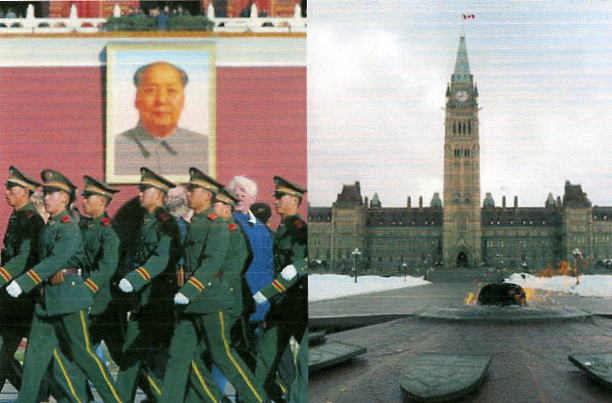


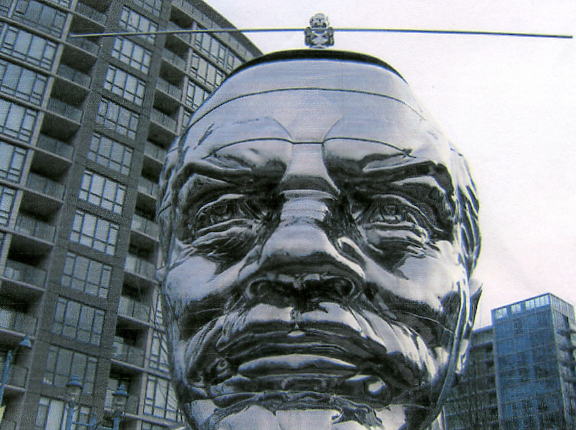
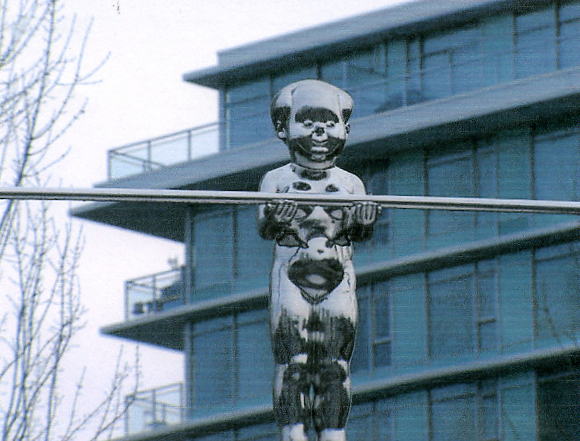

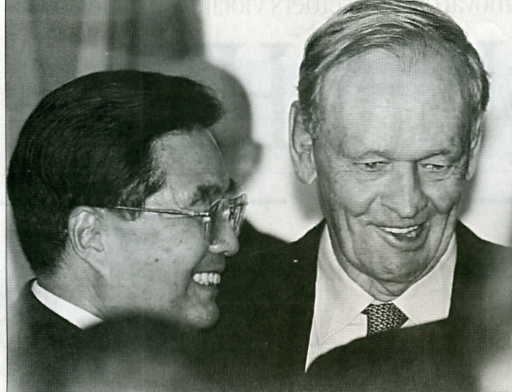
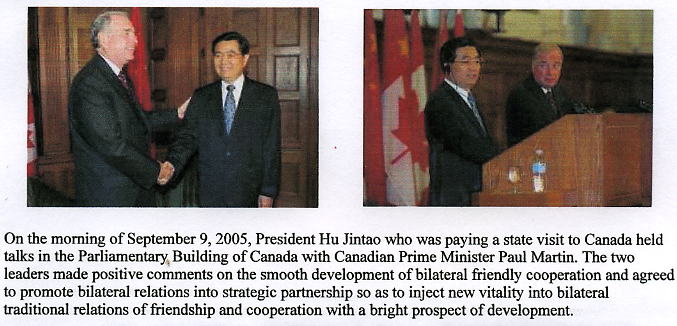
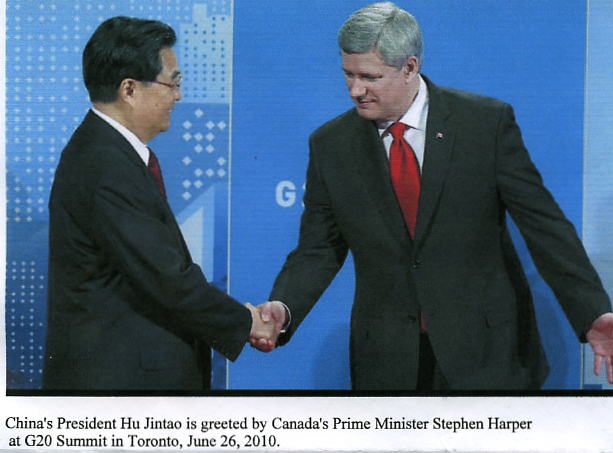




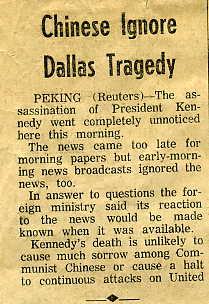
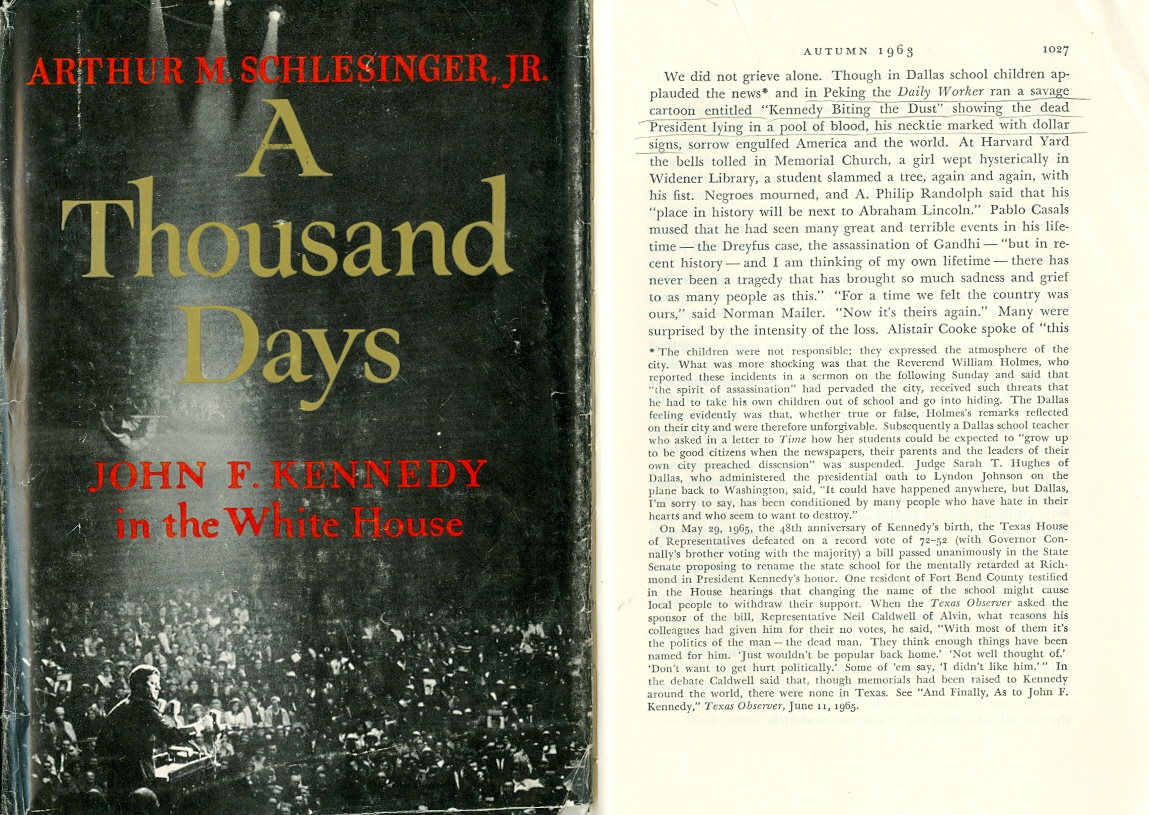




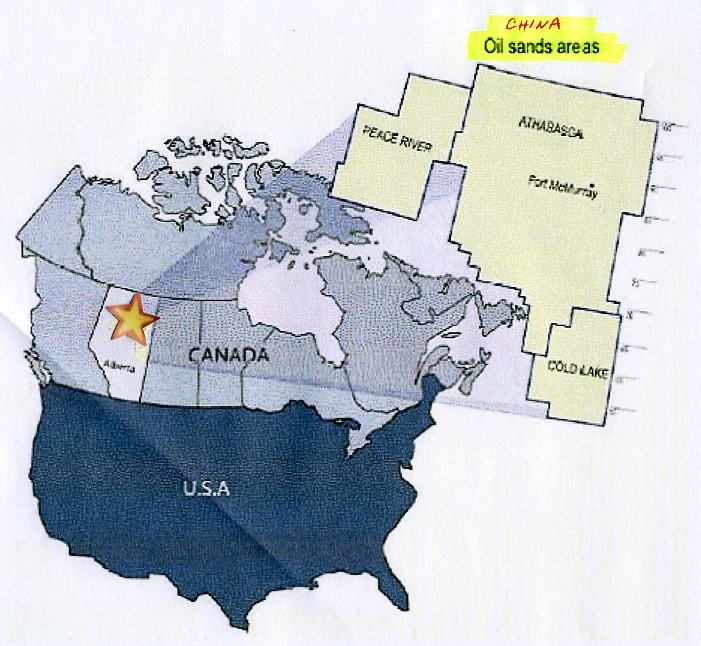

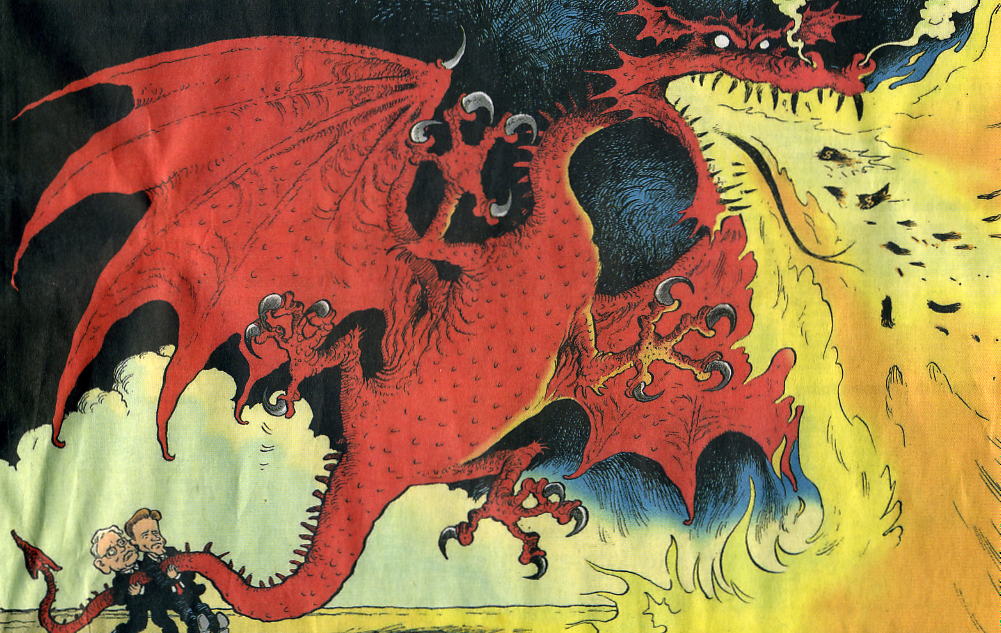







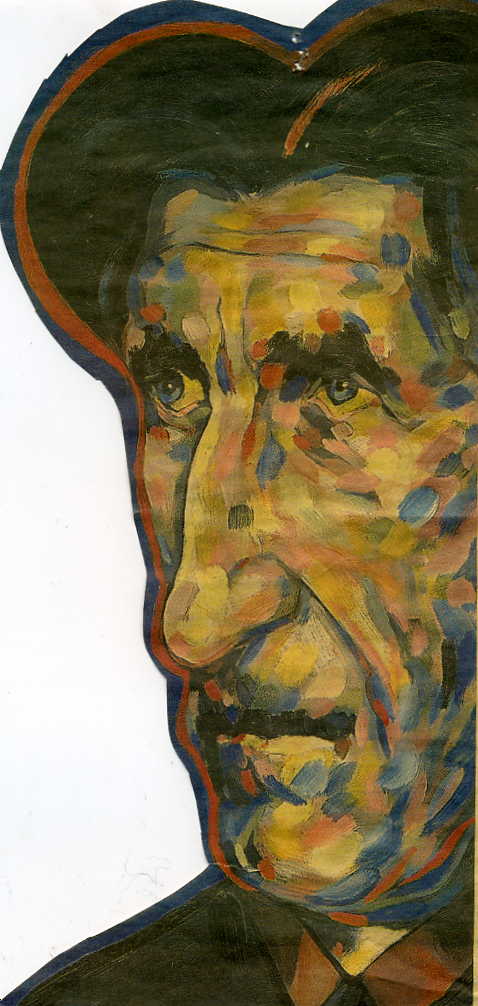
No comments:
Post a Comment
Comments always welcome!